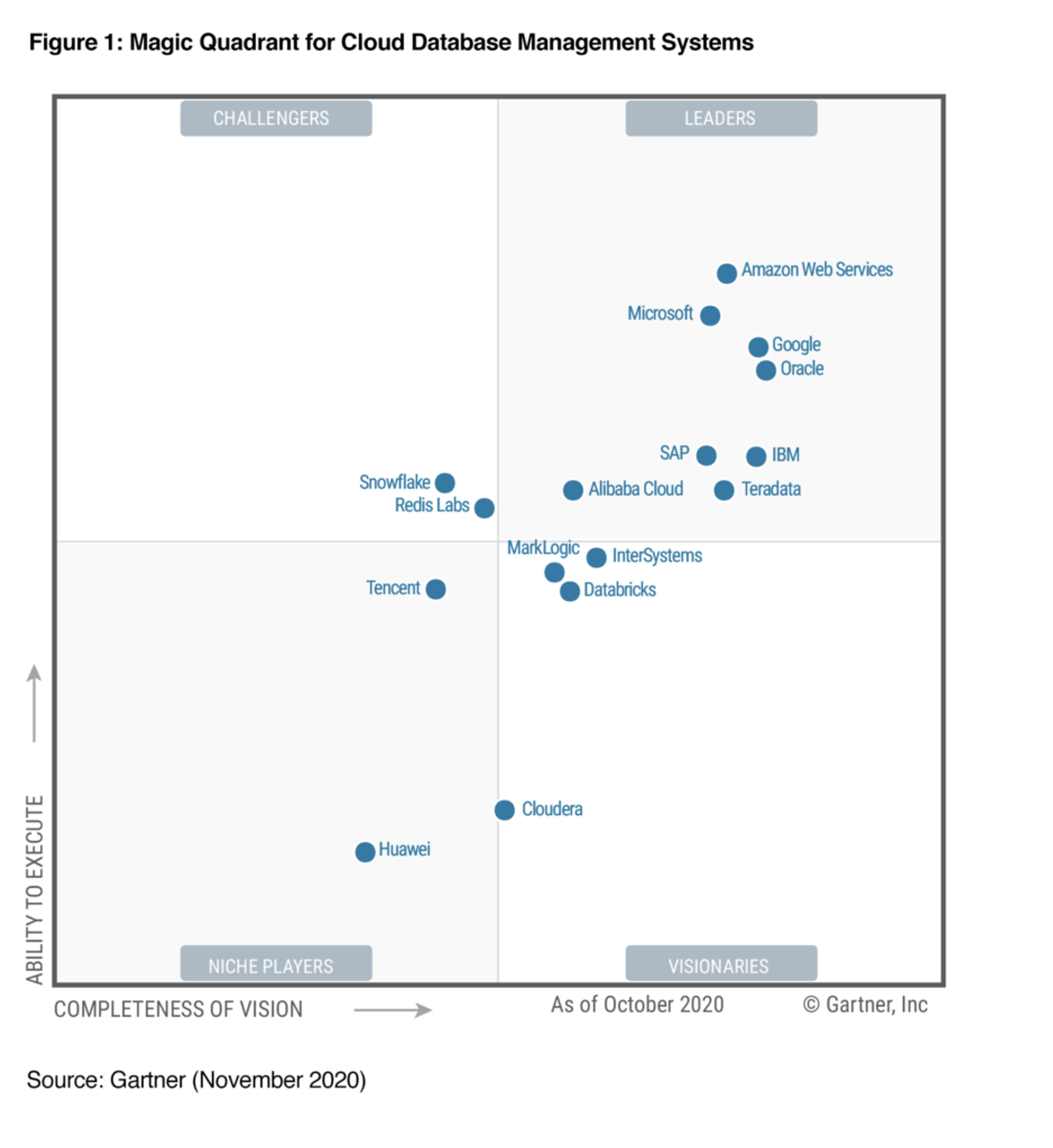Blog
Redis Labs Recognized in Inaugural 2020 Magic Quadrant for Cloud Database Management Systems by Gartner
This year has been like no other in memory. Among other challenges, COVID-19 has dramatically changed the way the world lives and works. For the database market, 2020 has accelerated shifts that were already transforming the industry: not merely moving to the cloud, but toward fully managed services from providers who can satisfy a wide array of advanced customer needs and use cases.
Recognizing this shift, Gartner has issued the first Magic Quadrant dedicated to cloud database management systems. Today, I’m happy to share that Redis Labs was positioned furthest to the right on the Completeness of Vision axis in the Challenger quadrant in the November 2020 Magic Quadrant for Cloud Database Management Systems by Gartner. A complimentary copy of the report is available here.
According to Gartner, “For the past few years cloud-managed DBMS service revenue has been outgrowing on-premises DBMS revenue. Most of the DBMS vendors with on-premises offerings have shifted their innovation and development efforts to managed cloud services.” The report further states, “We forecast that, by 2023, cloud DBMS revenue will account for 50% of the total DBMS market revenue.”
For this new Magic Quadrant, “Gartner defines the cloud database management system (DBMS) market as being that for products from vendors that supply fully provider-managed public or private cloud software systems that manage data in cloud storage. Data is stored in a cloud storage tier (such as a cloud object store, a distributed data store or other proprietary cloud storage infrastructure), and may use multiple data models—relational, nonrelational (document, key-value, wide-column, graph), geospatial, time series and others.”
November 2020 Magic Quadrant for Cloud Database Management Systems

This graphic was published by Gartner, Inc. as part of a larger research documentand should be evaluated in the context of the entire document. The Gartner document is available upon request from Redis.
Why Redis is rising
Redis Labs has seen tremendous growth and momentum over the past 12 months. Redis Labs closed our $100 million Series F financing round and achieved unicorn status as our valuation now exceeds $1 billion. This success has been driven, in part, by our growing partnerships with the three leading cloud providers. Our collaboration with Google Cloud is seeing massive adoption as we hit the first year anniversary of its launch. We also just launched Redis Enterprise tiers in public preview on Microsoft Azure Cache for Redis. And we have announced important new achievements in the Amazon Web Services (AWS) Partner Network––with more to come soon!
Ultimately, though, there’s a simple reason why companies of every size, industry, and geography are turning to Redis Enterprise Cloud: it simplifies and automates database provisioning so they can focus on building new innovations, rather than the required infrastructure. We’ve also built a fully managed data platform designed for the needs of modern applications; unified data across any deployment model (on-premises, hybrid, and multi-cloud) and around the globe, seamless migration of datasets, and elasticity with five-nines (99.999%) availability.
Redis Enterprise Cloud is now increasingly being used by customers for their primary database needs. Native Redis data structures and data models are enabling a wide range of high-performance use cases like transaction scoring, fraud mitigation, personalization, and much more. These uses are critical to many industries, including financial services, retailers, and gaming, as they seek to win in the online era.
Redis Enterprise Cloud solves the complex problem of provisioning and maintaining different databases for each data model by allowing multi-model operations across and between modules and the core Redis data structures. This is executed in a fully programmable and distributed manner, while maintaining instant, sub-millisecond latency developers expect from Redis. Meanwhile, we continue to build for the future to understand how applications’ data layer is changing with artificial intelligence and how Redis can help companies maximize the value of the real-time data they generate.
Redis Enterprise’s Gartner Peer Insights rating hits 4.9!
Even as Redis Enterprise was earning its place in the Magic Quadrant from Gartner’s analysts, Redis Enterprise users have also been showing unprecedented appreciation. In fact, our rating on Gartner’s Peer Insights for Operational Database Management Systems has climbed all the way to 4.9 out of 5 stars as of November 23, 2020, based on some 30 reviews in the last 12 months! That includes 87% five-star reviews and 13% four-star reviews, with no lower rated ones. In addition, 100% of the reviewers “would recommend” Redis Enterprise.
You can see an overview of the results on the Gartner Peer Insights page for Redis Labs.
While Redis Enterprise garnered high marks across the board, it’s highest ratings came for “High-speed, high volume processing” and “Ease of deployment” and “Timely and complete response to product questions,” “followed by “Ease of integration using standard APIs and tools,” “Timeliness of vendor’s response,” “Quality of technical support,” “Multiple data types/structures,” and “Administration and management.”
To illustrate, let’s look more closely at a few of the Gartner Peer Insights reviews of Redis Enterprise. In one review, an Associate Technical Manager in R&D at a $1 billion+ enterprise described Redis Enterprise as a “One-stop solution for enterprise caching needs.” The manager went on to explain that, “deployed as a centralized cache in a high-volume and highly available system, Redis [Enterprise] does what it does best for our deployment at scale.” In fact, the manager wrote, if they could do it all over again, they would “Start with Redis Enterprise first up, which would have definitely been a paradigm shift in terms of the technical approach but worthwhile nevertheless, instead of ending up with Redis Enterprise as the last option after trying out other options.” (Read the full review here.)
In another review, a Director of Information Systems Operations at a $500 million – $1 billion financial services company says that “Redis has been a great investment for our organization as we needed a solution for high-speed data caching. We needed a solution to provide instant data for our customers while also being extremely flexible and easy to work with for our engineers. The learning curve for Redis is small and within hours our database team had the solution up and running in a clustered POC.” The director also noted their team’s satisfaction with support: “Since we’ve purchased the solution, Redis support has been with us every step of the way to answer any questions about function, architecture, scalability, etc. We didn’t just buy a leader in caching, we invested in a partner relationship and couldn’t be happier.” (Read the full reviewhere.)
Redis Enterprise also continues to win fans in the cloud. One sales and marketing executive of a $50 million – $250 million enterprise put it as clearly as possible, calling Redis Enterprise an “excellent solution across cloud, on-premises, and hybrid deployments with resiliency, massive scalability, ease of management, and simple operation.” While the reviewer highlighted Redis Enterprise’s “performance, scalability, and innovation,” that scalability was what they liked best. (Read the full review here.)
Notably, another Solutions Engineering Executive at a $30B+ healthcare organization said that Redis’ “Multi-model capabilities allows expertise to be built on one database. Our industry is moving fast and Redis Enterprise allows our company to move even faster.” This executive notes that vendor relations are “A+” and their team is able to “get answers regarding hardware, licensing, and architecture/design without being passed to different areas and/or teams,” making it “very convenient and [enabling] quick decision making for our company.” (Read the full review here.)
A site reliability engineer at a $30B+ services company loves Redis Enterprise’s “bulletproof reliability” the most. “Redis Labs has been an excellent partner. We leverage their Enterprise Cluster technology in a core segment of our architecture,” they write. “We have found their technologies to be extremely reliable. Furthermore their support has been responsive and effective.” (Read the full review here.)
Make your voice heard
We love hearing from our customers, so now that you’ve read the November 2020 Gartner Magic Quadrant for Cloud Database Management Systems please share your thoughts on Gartner Peer Insights after experiencing the benefits of Redis Enterprise Cloud. We appreciate your support and feedback, so please keep them coming!
Finally, it’s once again time for AWS re:Invent, and we invite you to connect with Redis Labs on our special re:Invent page during the event, running from Monday, November 30 through Friday, December 18, 2020. This year’s event will be virtual, of course, but that means you can attend for free without flying to Vegas. And we’ve got a great lineup of exclusive content, sessions, and much more to help you learn about Redis Enterprise in the cloud.
Gartner disclaimer
Gartner does not endorse any vendor, product or service depicted in our research publications, and does not advise technology users to select only those vendors with the highest ratings or other designation. Gartner research publications consist of the opinions of the Gartner research organization and should not be construed as statements of fact. Gartner disclaims all warranties, expressed or implied, with respect to this research, including any warranties of merchantability or fitness for a particular purpose.
Gartner Peer Insights reviews constitute the subjective opinions of individual end users based on their own experiences and do not represent the views of Gartner or its affiliates.
Gartner, Magic Quadrant for Cloud Database Management Systems, Donald Feinberg, Merv Adrian, Rick Greenwald, Adam Ronthal, Henry Cook, 23 November 2020
Get started with Redis today
Speak to a Redis expert and learn more about enterprise-grade Redis today.
